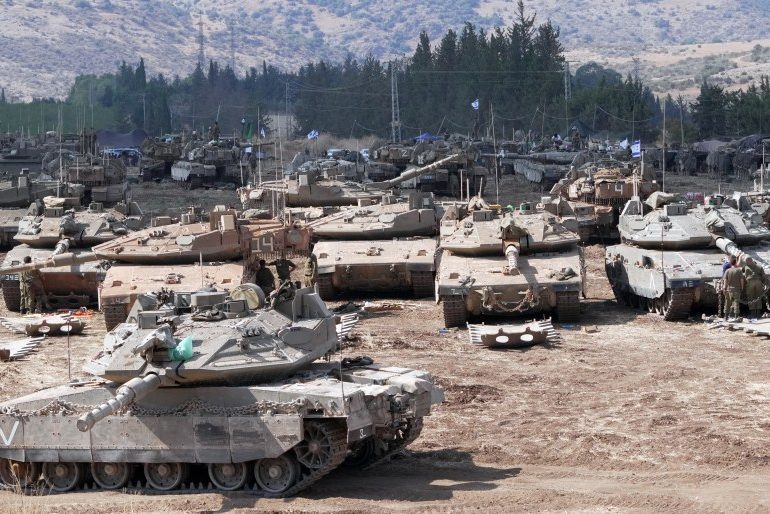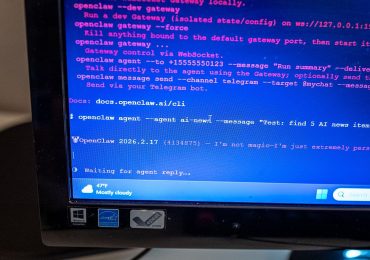THE UK Government has chartered a flight for Brits to escape Lebanon after thousands were urged to flee ahead of Israel’s full-scale invasion.
The IDF said it began “limited” and “localised” ground raids against Hezbollah terrorist targets in southern Lebanon last night.
Tanks at the Lebanon border before the invasion
Brits have been urged to leave Lebanon
Smoke can be seen billowing in the sky after an airstrike in Beirut
Israeli troops preparing to storm the border
An Israeli tank at the border in Lebanon
Israeli artillery shells hit areas in southern Lebanon
The evacuation flight was confirmed amid fears of further escalation in the Middle East.
It is due to leave Beirut-Rafic Hariri International Airport on Wednesday.
The rescue flight is for British nationals and their spouses, partners and children under 18 who will be prioritised, according to the Foreign Office.
Foreign Secretary David Lammy described the situation in Lebanon as “volatile” and with the “potential to deteriorate quickly.”
He added: “The safety of British nationals in Lebanon continues to be our utmost priority.
“That’s why the UK Government is chartering a flight to help those wanting to leave.
“It is vital that you leave now as further evacuation may not be guaranteed.”
There are an estimated 5,000 British citizens in Lebanon and the Government says it is working on “all contingency options”.
It is understood around 15 spaces for British nationals were secured on a flight which arrived on Sunday, and a further 40 on the flight due to leave on Tuesday.
Speaking to broadcasters earlier on Monday evening, Mr Lammy said: “We will do all that we can to assist people to get out and we have secured places on commercial flights that are flying tomorrow so that UK nationals can get out.
“I urge them to leave because the situation on the ground is fast-moving.”
He added: “And of course, whilst we will do everything we can to protect British nationals – and those plans are in place to do so – we cannot anticipate the circumstances and the speed with which we could do that if things escalate in a major way over the coming hours and days.”
Hundreds of Brit troops were deployed to Cyprus in case they needed to evacuate 10,000 Brits from Lebanon in an operation dubbed Meteoric.
On Monday, the PM’s spokesman said Sir Keir Starmer has been “very, very clear” that British nationals “should leave now, particularly whilst commercial flights are still available”.
AFPSmoke after an Israeli airstrike in Beirut[/caption]
He told reporters: “We’re doing everything we can to work with commercial airlines to maximise capacity because we want people to leave, and I understand that there have been extra Middle East Airlines flights leaving Lebanon over the weekend, another scheduled for Tuesday, and we have secured seats for British nationals on those flights.”
The rescue flight comes after Israel launched Operation Northern Arrows with troops and tanks storming southern Lebanon after Israel revealed special forces had already attacked defence tunnels inside the country.
In a statement just before midnight Monday UK time, the IDF said its boots on the ground were backed by artillery and the air force.
Tanks and military trucks have also been seen transported towards the border over the past few days.
The IDF revealed planning has been going on for months and was only launched after approval by political leaders.
They said: “The IDF began a few hours ago a targeted and demarcated ground operation in southern Lebanon against terrorist targets and infrastructures of the terrorist organisation Hezbollah.”
Prime Minister Benjamin Netanyahu vowed to double down on Hezbollah with “full force”.
The Israeli Defence Force (IDF) pledged they will fight the Iran-backed paramilitary group “until victory”.
Israeli defence minister Minister Yoav Gallant told troops deployed to the country’s northern border: “We will use all the forces from the air, sea and land”.
Hezbollah’s decade of destructive preperation
By Foreign News Reporter Juliana Cruz Lima
Following the 2006 Lebanon War, in which Israel and Hezbollah fought to a bloody standstill, the terror group began preparing for the next conflict.
They constructed a vast underground network across southern Lebanon.
The lessons of that war, in which Hezbollah’s small, mobile units were able to surprise and sometimes overpower Israeli forces, have been embedded in its military doctrine ever since.
The tunnels are now a key part of this strategy, allowing Hezbollah to replicate the tactics of insurgencies around the world: strike fast, disappear, and use the enemy’s size and strength against them.
Some of these tunnels have been found stretching into Israeli territory, designed to facilitate surprise raids deep inside northern Israel.
In 2018, the IDF launched Operation Northern Shield, a months-long mission to detect and destroy Hezbollah’s cross-border tunnels.
The discovery of these tunnels — some reinforced with concrete and running dozens of meters underground — revealed just how advanced Hezbollah’s capabilities had become.
Last month, Hezbollah revealed its hidden terror tunnel network from which missiles can be launched in a chilling threat to Israel.
A blood-curdling video released by the Lebanese terrorists revealed a giant underground roads with enough room for lorries to transport their deadly weapons.
Posters of leaders and soldiers adorn the tall stone walls as heavily armed men speed through the “missile city” in motorbikes.
Trucks loaded with enormous missiles make their way through the dark roads in a frightening glimpse of the terrorists’ arsenal.
Drone footage then shows the seemingly endless terror maze, which also appears to be home to military tech and computers.
Inside the terror tunnels, Hezbollah fighters can move unseen, store weapons, and launch ambushes, creating a dangerous cat-and-mouse game with the IDF.
They can also move into a much larger network of bunkers, missile silos, and command centres, deeply embedded in civilian areas.
These tunnels – which can stretch for miles – link critical positions, allowing Hezbollah fighters to emerge, strike, and then vanish back underground before Israel can respond.
Reports also suggest that Hezbollah has been expanding its tunnel network in southern Lebanon in recent weeks.









